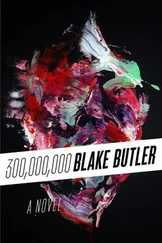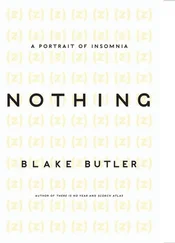That night the shrieking tone really erupted. The house stood on its side. The fibers in the house’s rooms erected from their expanses, spindling the hallways with weird fur. The tone went so large it bashed past hearing and into nowhere, colorlessness, then back to loud — so strong it popped blood vessels in the child’s eyes while he was sleeping — all he saw when he woke again was masked in pillowed red. He didn’t mind.
The tone ripped the mother’s clothing against her body through the seams, her skin smashed patchy with the resounding tenor, thin bloodshot lines creased through her flesh — spraying the lining of her innards with the spittle of cracking meat, stirring the remainders of what had gathered in her womb there into pigments, changing its face —a living mush of no known name. It brought the house’s eaves down, cracked the mantle, splashed the windows back to sand, braided the long hairs on the carpet, from the bodies. It peeled the wire out of the hallways, blanched the shutters. It slid its incision in most all things until air itself was hardly there, the night corralled to skeins of dust.
Inside the house, the rooms went warbly and became several rooms at once — where in them people laid on long beds laughing, the light of no moon strumming their nude and something flexed where nothing was. On the air you could see pilling, tiny spindled segments of the seconds split into hyphae, kaleidoscopic cells. The rooms reconvened then, and seemed to lift a little, becoming slurred in as the tone rummaged through the windows of each blink — the reconditioned post-stink stirring of each of these rooms and what they’d held, what they were holding, what they would hold now in the way of some new condition — all there scrambled or erased.
There was a shaking then. There was a long rip, coming from one direction then another. There were a million little tones. You couldn’t even hear it — as it began it had always been — the sound of something larger than the whole earth. The tone burped through light and carved it well into a strobe that in repetition appeared to slow down to gone again, while the day shook in the pummel of one thousand drums, the light around it breaking at the knit, pulling anything that had lived longer than it all apart.
When the air again was silent, the mother and the son found themselves outside the house. Where the house had been was mostly nil. Some of the wires that had once held the house down, connected — power, TV, sound, heat, air, telephonic, light, breeze, monitor, alarm — spread sprayed in worming threads up toward the skylight dome nodule that had been installed above the house for weather interpretation. Their fibrous fraying zapped electrons and gave off heat, making cursive on the air. There were rutted suggestions of where the house’s rooms had been — weight, impression, space, regard — but the rooms themselves were no longer there.
The mother watched the newly grown child — bigger than her now, a thing she could not carry, ever again — he stood in the air where the den had been, wielding a remote. Though the TV —or whatever else the remote had controlled —was no longer there he stood there staring like it was, stroking buttons to err the channel, raise the volume, on or off. She felt some kind of recognition in this action. She shook her head until it fell away. She went and took Person 2030 by his cold forearm— so thick she could not make her fingers go around— she felt him rip away. She watched him hulk his hands and stamp the ground with clumsy footfalls, cutting holes into the home’s foundation, from which long thin animals reeked and surged, spouting up from where they’d hidden there inside the earth the very instant 2030’s presence popped an exit. She could not believe what all had been underneath them all those hours, what other space inside the musk of earth there was, and now above them where the air above the house had come apart. Long claps of gross wind hung combed over through long stunted portholes chafing sections of other air entirely mostly discolored or strapped with lines. The state had ordered an apparatus around the larger sections, a scaffolding made of semi-transparent polymer — so as to preserve the vast billboard horizon, they said, no eyesores —though you could still see the outlined shape of what was made. A maze, a bent-up aero-ghetto, half-abandoned in its make, the long braches of corridors meant to place order on the shifting shit sky left undone by the mass death of city workers, men like her disappearing mate — they’d begun falling from their ladders, out of skyscraper windows, thrown from trucks, choked by their ties or other costumes, the interstate spun to knots — whole long strips of street once connecting cities now rewired into loops, crammed with battalions marooned cars, sweltered with the bloated bodies of those who could not find a way to climb down, who spent their last days licking the crumbs up from the dash of where the light hid among the sky.
In some places now, hung on the half-assed aerial architecture, men huddled hidden, using their pants for roofs or flags, the mother saw. Whole colonies had jimmied nooks into the new air, thought most of them, by now, were dead. Others just hung on awnings, apses, little outhung nodules to which they’d tied their necks and jumped. Grappled and grappling. Fat with mucus. Getting groaned. Even without the want, the news would tell you, one could wither through exposure in almost no time, now, with the way the sun could just come on. Count your minutes. Stay inside.
STAY INSIDE, the nation’s mantra.
Our house, motherfucker, the mother said aloud into the larger light, is gone.
In her own face reflected in the milky leather of what that destroyed space she saw the lines she’d been made of all these years there worked or wormed, each readjusting in the seared meat. There was the bruise still on her neck’s bulb from where when she was nine she fell into a hive. The bees had stung her all in the same place, one after another, ignoring all her other flesh; she had swollen that day to an enormous size, but no one else had noticed. Here she was again. Here was her neck now slushed to bands of wriggle, strummed in black chords by the hands that had grown up in her gut — her gut as gushed and gobbling as the thing inside her spread into her, was her, wanted more. Here were her arm follicles all groaning, giving off sound that matched the tone — the tone so omnipresent and gashed and slurping now that it had become a number on the air, pressed on all people. Her pores resembled tree bark, cracked and capped off with old lines of other age and rash and ranting, worn inside with where little bugs embarked, making new homes inside her fat, drawing strips along in rip to meld with other stations on the house. Here were the mother’s tiny teeth — each one that much ouched over the other — screwing her gums deeper when they wanted — aching one another out — the nights of screeching — the endless bleeding — how she cared for them in floss — burned from white to orange to yellow, red to brown to black to gone — and yet here again, like doors. Here were the mother’s birthing thighs nicked fat with sore spots grown wide as doorways, wide as suns. With the proper aim and angle and volition, one could lean into them and disappear.
I guess what happened then is the mother and the son, they walked, though there was nowhere for them to go. The grass where the neighborhood had once hosted a garden later used for ritual burial had grown so high it seemed a sea, and, surely, inside it, there were a billion bodies lost and rotting, as the stench that rose made wavy lines like heat grade on the hemisphere of breath. I guess the road that had always led out of the front gates to a street that led to shopping centers was now so cracked in so many places that the asphalt resembled undentisted teeth, the gaping mouth of all worn around them which would suck you in alive in stench.
Читать дальше












